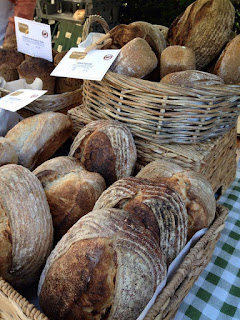Apologies to you all for not having written anything for the last two years. Life has been getting in the way of the creative process and nothing much has inspired me to write - until now! So what has inspired me? Well in short, my daughter and the Real Bread Campaign.
What on earth has that to do with Sopwell, you ask. Indirectly, I think, quite a lot.
For a start, the name Sopwell comes from the pious women of the 12th century who lived on bread and water dipped in the well – sops. Also, we had three mills on our stretch of the river Ver where flour was milled for bread: New Barnes Mill, Sopwell Mill and Cottonmill. One of our streets is named after George Butterfield, the last miller of St Albans, and we also have Millers Rise.
But, milling, bread and flour have even more associations with our area. Many of you may not know that in Old London Road there used to be the Research Association of British Flour Millers Cereals Research Station. It was founded in 1923 and closed down when it merged with the British Baking Industries Research Association in 1967 to become the Flour Milling and Baking Research Association (FMBRA). This Research Association was based in Chorley Wood. I wonder how many of you have heard of or know about Chorleywood and bread-making? To bakers of real bread, the name Chorleywood is an anathema as it is associated with poor quality supermarket wrapped sliced bread. In the 1960s, researchers in the FMBRA discovered that by adding hard fats, extra yeast and a number of chemicals called “Bread Improvers” to the dough and mixing it at high speed you had a dough that was ready to bake in a fraction of the time it normally took. This became known as the “Chorleywood Bread Process”. You really don’t want to know what is in these so-called improvers, but hair is involved!! The big factory bakers very quickly adopted the process and were able to produce loaves very quickly and cheaply with the result that many small craft bakers went out of business because they could not compete on price. To read more about the rise of the supermarket loaf click here: http://www.bbc.co.uk/news/magazine-13670278
Industrial loaves have very little proving time and therefore, artificial flavourings are added to cover up the taste of the chemical cocktail that is added to assist with the rise and loaf structure! The process means that fermentation is quick and the yeast is not killed off with the result that fermentation continues in our digestive systems which can cause bloating and other digestive problems. So now we come to the Real Bread Campaign which is rather like the Campaign for Real Ale to encourage people to eat bread made from natural ingredients using a slower process and to shun those loaves made with additives. https://www.sustainweb.org/realbread
One Real Bread campaigner is my daughter who is a craft baker. She makes her basic sourdough bread from just flour water and a bit of salt. Check out her blog: www.josloaves.co.uk.
So Sopwell has played its part in the fall and rise of Real Bread!
---
Sandy Norman

No comments:
Post a Comment